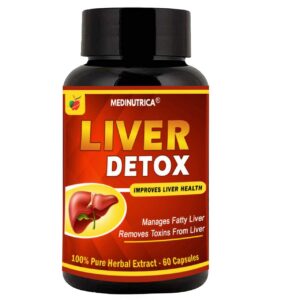Ayurveda, the traditional system of medicine in India, offers holistic approaches to address health issues, including fatty liver. Keep in mind that it’s crucial to consult with a healthcare professional before starting any new treatment or making significant changes to your diet and lifestyle.
Here are some Ayurvedic recommendations for supporting liver health and addressing fatty liver:
1. Dietary Changes
- Avoid Fried and Processed Foods: Reduce the intake of fried and processed foods, as they can contribute to liver congestion.
- Include Bitter Foods: Bitter vegetables like bitter gourd (karela), dandelion greens, and arugula can help stimulate the liver.
- Herbs and Supplements:
- Triphala: Triphala is a traditional Ayurvedic combination of three fruits (amalaki, bibhitaki, and haritaki) known for its detoxifying properties. It can help support liver function.
- Turmeric (Curcumin): Turmeric, as mentioned earlier, has anti-inflammatory properties and may support liver health. Consider taking it in supplement form.
- Bhumyamalaki (Phyllanthus niruri): This herb is believed to have hepatoprotective properties and may help in managing liver conditions
2. Exercise
Engage in regular physical activity. Exercise helps in weight management and can improve insulin sensitivity, reducing the risk of non-alcoholic fatty liver disease (NAFLD).
- Yoga and Meditation: Yoga and meditation can be beneficial in managing fatty liver problems through various mechanisms, including stress reduction, improvement in overall well-being, and support for healthy lifestyle habits. Here are some ways in which yoga and meditation can contribute to controlling fatty liver issues:
- Stress Reduction:
Chronic stress is associated with the release of stress hormones, which can contribute to inflammation and metabolic disturbances, potentially worsening fatty liver conditions.
Yoga and meditation are known for their stress-reducing effects. Practices such as deep breathing, mindfulness, and relaxation techniques help activate the body’s relaxation response, which can counteract the negative impacts of chronic stress.
- Weight Management:
Certain yoga practices involve physical activity that can contribute to weight management. Maintaining a healthy weight is crucial for preventing and managing fatty liver disease.
Regular yoga sessions, especially those that include dynamic sequences or power yoga, can help burn calories and improve metabolic function.
- Improved Insulin Sensitivity:
Some studies suggest that yoga and meditation practices may improve insulin sensitivity. Improved insulin sensitivity can be beneficial for individuals with fatty liver, as insulin resistance is a common factor in the development of non-alcoholic fatty liver disease (NAFLD).
- Healthy Lifestyle Habits:
Engaging in regular yoga and meditation often promotes a more mindful and conscious approach to lifestyle choices, including diet.
Mindful eating, promoted through yoga and meditation, encourages awareness of hunger and fullness cues, potentially leading to healthier food choices and portion control.
- Enhanced Sleep Quality:
Lack of quality sleep is associated with various metabolic disorders, including fatty liver disease. Yoga and meditation can promote relaxation and improve sleep quality, contributing to overall metabolic health.
- Liver Support:
Certain yoga poses may be beneficial for improving blood circulation and supporting liver function indirectly.
Practices such as twisting poses are believed to stimulate the abdominal organs, potentially aiding in digestion and liver health.
3. Hydration
Water Intake: Stay well-hydrated. Water is essential for flushing out toxins from the body and supporting overall liver function.
4. Ayurvedic Therapies
Ayurvedic therapies aim to balance the body’s doshas (energetic forces), improve digestion, and eliminate toxins, thereby promoting overall health. While individual responses may vary, Ayurvedic therapies can potentially support the management of fatty liver through several approaches:
- Panchakarma:
Panchakarma is a set of Ayurvedic detoxification procedures that aim to eliminate accumulated toxins (ama) from the body.
Therapies such as Vamana (therapeutic vomiting) and Virechana (therapeutic purgation) are believed to help remove excess Kapha dosha and toxins from the digestive system.
Panchakarma is typically administered under the guidance of an Ayurvedic practitioner and is customized based on an individual’s constitution and health condition.
- Herbal Remedies:
Ayurvedic herbs are often used to support liver function and address imbalances. Some herbs with potential hepatoprotective properties include Bhumyamalaki (Phyllanthus niruri), Kutki (Picrorhiza kurroa), and Punarnava (Boerhavia diffusa).
Ayurvedic practitioners may prescribe specific herbal formulations based on an individual’s dosha, imbalances, and overall health.
- Lifestyle Modifications:
Ayurveda considers lifestyle factors, including sleep, exercise, and stress management, as integral to overall well-being.
Ayurvedic lifestyle recommendations may include specific daily routines (Dinacharya) and seasonal practices (Ritucharya) to promote balance and prevent imbalances.
Medinutrica Liver Detox 30 & 60 Veg Capsules
The Liver Detox Capsule is an exceptional blend designed to support the overall health of the liver. Its primary function is to safeguard the liver by eliminating harmful toxins, thus preventing any potential damage and enhancing its functionality. Moreover, the Liver Detox Capsule offers the added benefits of incorporating special herbs such as Kasani, Kal meg, Kutki, Bhringraj, Punarnava, Bhoomi Amla, and more.



